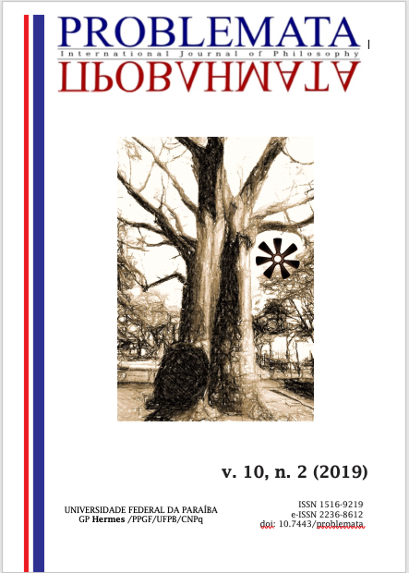THE KILOMBISM:
AN EXPRESSION OF AFROPERSPECTIVIST POLITICAL PHILOSOPHY
DOI:
https://doi.org/10.7443/problemata.v10i2.49174Keywords:
Afroperspectivist Political Philosophy, Project, Black Agency, QuilombismoAbstract
This article intends to make an introductory analysis about what is the Afroperspective Political Philosophy, from this conception, to analyze to what extent the Quilombismo, movement and political project of society, proposed by the philosopher Abdias Nascimento, can be understood as an expression of a philosophy. Afro-Brazilian politics (Afroperspectivist). It is assumed that the black population has historically been the victim of an agorophobic political system, which has silenced its political agency, and that Afro-Perspective philosophy rescues the cultural, intellectual and political memory and memory of the diasporic peoples. In conclusion, the present text presents the thought of Abdias Nascimento as an expression of Afro-Brazilian political philosophy to the evidence of the libertarian and revolutionary character of the Quilombista National State project. Reiterates the importance of political philosophy rescuing and investigating other projects of society that have as their axis the true freedom of peoples, especially the black and indigenous people if, in fact, we want a future project of society in which everyone can live well
Downloads
References
CARNEIRO, Sueli Aparecida. A construção do Outro como Não-Ser como fundamento do Ser. Tese (Doutorado em Educação), Faculdade de Educação, Universidade de São Paulo, SãoPaulo, 2005. 339p. Disponível em <https://negrasoulblog.files.wordpress.com/2016/04/a-construc3a7c3a3o-do-outro-como-nc3a3o-ser-como-fundamento-do-ser-sueli-carneiro-tese1.pdf> Acesso 01 jun. 2019
DE MORAES, Wallace. Governados por quem? Diferentes plutocracias nas histórias políticas de Brasil e Venezuela. Curitiba: Editora Prismas, 2018.
DUPUIS-DÉRI, Francis. Quem tem medo do povo? O debate entre Ágora-fobia Política e Ágora-filia Política. Revista Estudos Libertários (REL), UFRJ, vol.1. Disponível em <https://revistas.ufrj.br/index.php/estudoslibertarios/article/view/24084/13884> Acesso em 22 mai. 2019.
LIMEIRA, Jose Carlos. Insônias. Disponível em <http://leituraspretas.blogspot.com/2014/11/jose-carlos-limeira-paginas-negras.html> Acesso 10 jun. 2019.
NASCIMENTO, Abdias do. O Quilombismo. Petrópolis: Vozes, 1980.
____________________. O Quilombismo. São Paulo: Editora Perspectiva, Rio de Janeiro: Ipeafro, 2019.
NGOENHA, Severino Elias. Os tempos da filosofia: filosofia e democracia moçambicana. Maputo. Imprensa Universitária, 2004.
__________________. Filosofia africana das independências às liberdades. Maputo. Edições Paulistas – África, 1993.
NOGUERA, Renato. O Ensino de Filosofia e a Lei 10.639. Rio de Janeiro: CEAP, 2011.
_________________. infantilização, ubuntu e tekoporã: elementos gerais para educação e ética afroperspectivistas.Childhood&Philosophy, Rio de Janeiro, v. 14, n. 31, set.-dez. 2018, pp. 625-644. Disponível em<https://www.e-publicacoes.uerj.br/index.php/childhood/article/view/36200/26377> Acesso em 30 jun.2019.
SANTOS, Gislene Aparecida dos. A invenção do “ser negro”: um percurso das ideias que naturalizaram a inferioridade dos negros. São Paulo: Educ/Fapesp, Rio de Janeiro: Pallas, 2002, 176p
Downloads
Published
Issue
Section
License
Authors who publish with this journal agree to the following terms:
- Authors retain copyright and grant the journal right of first publication with the work simultaneously licensed under a Creative Commons Attribution License that allows others to share the work with an acknowledgement of the work's authorship and initial publication in this journal.
- Authors are able to enter into separate, additional contractual arrangements for the non-exclusive distribution of the journal's published version of the work (e.g., post it to an institutional repository or publish it in a book), with an acknowledgement of its initial publication in this journal.
-
- Authors are permitted and encouraged to post their work online (e.g., in institutional repositories or on their website) prior to and during the submission process, as it can lead to productive exchanges, as well as earlier and greater citation of published work (See The Effect of Open Access).





